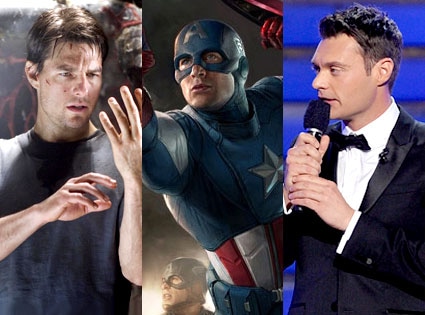 Paramount Pictures; Marvel; Kevin Winter/FOX
Paramount Pictures; Marvel; Kevin Winter/FOXThe day, it is understood, changed everything.
But how did 9/11 really change Hollywood—and its audience? Plenty, but here are five of the biggest ways:
1. The Superhero Explosion: In the decade before 9/11, not a single man-in-tights movie led its year as the No. 1 box-office hit. Then, less than eight months after the terror attacks, the original Sam Raimi Spider-Man opened, and rewrote the record book. Moviegoers, never exactly adverse to heroes, suddenly were hungry for super-sized ones. Batman and Superman were dusted off; Iron Man, Thor, the Fantastic Four and more were all drafted. The comic-book's moment had arrived.
2. America First: True enough, the American consumer has always responded to flag-friendly titles. But since Sept. 11, there's no mistaking "America" is the producer's and viewer's choice, from America's Got Talent to Captain America (a gimme, granted) to the show that has dominated pop culture for eight of the last 10 TV seasons, American Idol.
3. Manly Men (and Women, Too): Firefighters, police and other rescue workers who ran toward disaster, rather than away from it, were revered more than ever in the post-9/11 world, and the burgeoning reality-TV genre was their tribute. For every Teen Mom trainwreck, there were countless more Ice Road truckers, Deadliest Catch seafarers and Dirty Jobs doers.
4. All Tickers, All the Time: Amid the information-overload of Sept. 11, Fox News ushered in the modern era of the ever-present headline scroll: It was running commentary for a world that needed a lot of explaining, and it hasn't stopped running since. Some people hate it; probably more would feel lost without it.
5. A Whole New War of the Worlds: In the months after Pearl Harbor, Hollywood cranked out the war movies for a receptive nation. In the 10 years since 9/11, films still can't address the New York and Washington D.C. events without being accused of being "offensive" (see: the disdain for Robert Pattinson's Remember Me) or largely shunned (see: the modest box-office returns for Oliver Stone's World Trade Center and the Oscar-nominated United 93). Steven Spielberg probably came the closest to breaking down our barriers, but even he had to do it in the guise of a space-alien attack. The audience asked for space, and, for once, got it.
And that's just for starters. Have a look: